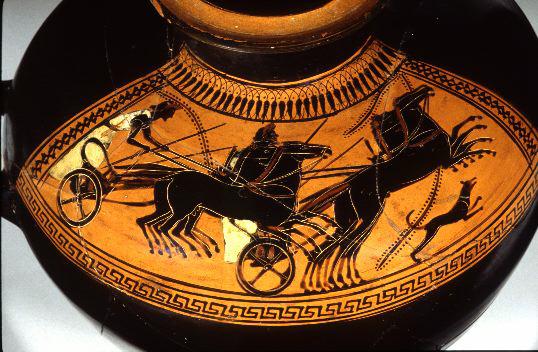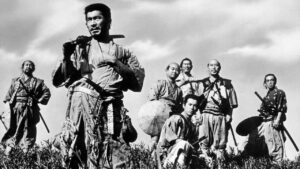The Olympic Games weren’t always as majestic as they are today. In our modern times, every four years the eager anticipation of once again witnessing the talent of nationally recognized athletes competing overshadows any other occurring events; that’s exactly how it was in ancient Greece. However, the purpose for the games has shifted over time. The first Olympic games made its mark in history in 776 B.C.E. Competition within ancient Greece was intended to demonstrate power and wealth to the Greek world. The human body was treasured for its physical capacity. As a result, competitive games often tested the endurance of the body. Festivals honoring the Greek gods were also a popular setting for hosting competitions. Although they were not yet named Olympic games, these competitions attracted crowds interested in moments of exhilaration in their otherwise ordinary lives. At that time, the games were a uniting hallmark of Greek culture and religion, a recognition of athleticism, as well as an indicator of Greek wealth and prowess that contributed to Greek self-identity.1

Religious festivals were celebrations honoring the Greeks’ gods and goddesses. The Greeks praised the gods; a way of doing so was by partaking in the funeral games, such as the one that Homer tells us about in his epic poem Iliad, where the hero Achilles holds such games in honor of his dead friend Patroclus.2 Today we attend funerals that are full of sorrow and sympathy, but the services the Greeks would host were filled with enjoyment and competition. They saw this as a way to honor and worship the gods, by acting in competitive games. Many of the athletic events eventually evolved into the Olympics. Chariot races of dashing horses, wrestling and boxing matches that were barbarous, foot races, discus throwing, archery, and spear throwing were the activities everyone put their time into at this festival.3
The Greeks believed that Zeus would favor some athletes and deny victory to others, so the athletes who were not denied saw this as empowering. The Greeks loved to be seen as worthy by the gods, so when Zeus would favor certain athletes, those competitors became evermore interested in the outcome of the games. The Nemean Games honoring Zeus was a huge festival the Greeks attended. One of the myths describing the origins of these games claims that they began as funeral games for prince Opheltes, who died as a baby in Nemea. During this festival, athletic and equestrian events were held. The Greek gods contributed to the start of the games. They were divinities that the people looked up to in a literal sense, since their home was thought to be at the top of Mount Olympus, “home of the gods and goddesses.” However, who was allowed into the games? Well, it turns out that if one weren’t Greek or if one spoke a different language, one was forbidden from entering or participating. Only free men were initially allowed to participate in games. Women were prohibited from engaging in or watching the games because the games tended to get severely brutal, and such brutality would scar the eyes of the women.4

In Homer’s portrayal of the funeral games for Patroclus, the hero Diomedes was the first to win the chariot race. He was rewarded with a slave woman and a cauldron. Prizes in the Olympics weren’t always like the ones Diomedes received, but they were ones that would make a Greek famous and rich.5 The winning athletes were presented with a wreath of olive leaves. Also, the city-state or polis for which they were representing gave the competitor a monetary award.6 But for equestrian events, the rider was never given the prize; it was given to the owner of the horse. The games in the Olympics were not quite the same ones we have today. The games in ancient Greece evolved into more challenging events. For example, the chariot races then had competitors racing while wearing armor; today, we no longer have this game. A popular competitive event today is volleyball, but it did not exist in the ancient Greek events. This is an example as to the changes that have been made over time.
Preparation for their exercises during training was a big deal to the instructors and to the athletes. The Anointer played a role in their training. He was the one who would smear oil on the athletes’ bodies in a certain circular technique; he kept the athletes’ bodies relaxed by doing this. Greeks would have to train for at least ten months before they would partake in their specific duels.7 One of the famous wrestlers, Milo, is an example as to how the athletes would train. Milo carried a calf over his shoulder every day, so the heavier the calf, the faster and stronger his body became. His training led him to win thirty-two wrestling competitions; to show that he was capable of doing this he had carried an ox on his shoulders through the Olympia stadium.8
One of the most important outcomes from the start of the Greek Olympic games was that every time they hosted them, all conflicts were put on hold between all Greek poleis or city-states. The competitions were a chance for the Greeks from different poleis to intermingle. The leaders from the different poleis went to support their athletes, but also to negotiate political disputes with the other leaders. This was called the Olympic truce, meaning that there was an agreement on making sure that there would be no warfare occurring during the games. This truce was made to maintain the focus on the games. The Greek religion was mainly about worshiping the mythological gods and goddesses, so the Olympics became a practice for the people in honoring their gods. Those who participated in the games were held at a high standard because they were representing their polis. In ancient Greece, the games gave the city-states the opportunity to come together and work out their conflicts face-to-face without warfare. In the modern era, we too strive for the same thing, for the Olympics to be a bridge between peoples and a place where political differences are set aside. But there have been many situations in the past that causes it to be troubling in this era.
- Salem Press Encyclopedia, January 2016, s.v. “Religion and Mythology in Ancient Greece,” by Judy Johnson. ↵
- Homer, Iliad (Boston: Houghton Mifflin & Company, 1881), 240-252. ↵
- Salem Press Encyclopedia, January 2015, s.v. “Olympic Games in the Ancient World,” by Thomas J. Sienkewicz. ↵
- Salem Press Encyclopedia, September 2016, s.v. “Sports and Entertainment in the Ancient World,” by Patrick Adcock. ↵
- Homer, Iliad (Boston: Houghton Mifflin & Company, 1881), 240-252. ↵
- Barbara Maussier, “The New Ethical Dimension of Sports Events: a Reflection on the Evolution from the Ancient Greek Olympic Sports Festival to Postmodern Sports Events,”Cultura, Ciencia y Deporte 12, no. 34 (January 2017): 21. ↵
- Salem Press Encyclopedia, September 2016, s.v. “Sports and Entertainment in the Ancient World,” by Patrick Adcock. ↵
- Encyclopaedia Britannica, June 2017, s.v. “Milo of Croton.” ↵



73 comments
Anthony Robledo
I love watching the olympics! Sadly i have yet to go watch one in person but i would go in a heartbeat if i could. This article automatically caught my attention because of the title and the pictures! It was great to find out the history behind the games i love to watch. The way competition was fot yhe greeks was just outstanding. To this day, i feel like i have greek blood in my veins because of my passion for competetion. Great article, i hope to read more articles like this.
Carlos Aparicio
I love the Olympics so much and I never even bothered to find out how the origins came to be! This article gave me so much information with how the olympics started! I was not aware that the Greeks gave birth to the Olympics, but now the Olympics travel around the entire globe every 4 years. I found it interesting how that Zeus would favor the some athletes and deny victory to others. It makes me wonder if the Greek Olympics were rigged at times. Well informative article.
Alejandra Mendez
This was a very well written and informative article and helped me have a better understanding of the Olympic games. I knew that the Olympic games were definitely not then how they are now. However, I was never completely sure of what those differences were. It’s amazing to see how far we become from the first Olympic games to now and how much has really changed since then as well. I also did not know that they were originally used as a form of funerals for the deceased.
Aaiyanna Johnson
It seems crazy that centuries ago, they too were engaging in their own Olympics and from funerals. I like that they considered the games as their worship. It is nice to know that they took pride in their athletes just like countries of today’s Olympics do. Even though they were competing against each other they were still peaceful towards one another.
Samman Tyata
I found your article well managed and informative. Your article has successfully helped me to know more about the startup of the Olympic Games. It was interesting to know that religious festivals were celebrations honoring the Greeks’ gods and goddesses. I knew some background details about the content but you provided such great detail that I definitely learned a lot by the end. To sum it up, it was a good and informative read.
Alexis Soto
Interesting article about the origins of the Greek Olympic Games! I had little knowledge of the ancient games or why and how they came about. It made sense how the Greeks, who cherished the human body, would come up with a way to demonstrate physical feats to demonstrate power and wealth. Another interesting fact was how the Greeks would suspend any conflict in order to participate in the games.
Cherice Leach
What an interesting topic. Who knew the Olympic games started out to honor the deceased. It seems kind of strange to me that they would be celebrating and playing games or battling in duels after a friend has passed but hey at least something good came out of it. It’s also interesting to see that all of the original games played in the Olympics by the Greek have all been changed and modernized to the sports that are favorites today.
Sebastian Castro Ramos
The Olympics has always been an event that has interested me because athletes show the peak of human performance in different sports. This is how ancient Greeks thought about it too, and it is impressive how this games were used to worship their gods, or to show respects for the dead. With respect to only men being able to participate, an interesting fact I learned some time ago is that athletes would compete without wearing clothes to ensure they were men, and not women posing as men. Excellent article!
Andrew Rodriguez
Nothing has changed in the Olympic process of the four years. That is very outstanding that we kept the main thing about the games over the years. That is a outstanding tradition that hasn’t been changed. I’m pretty sure that they didn’t see the games becoming as big as they become in the modern world. Having to train to stay ahead or stay in the competition is the essence of Olympic games. This was a very entertaining article, and detailed.
Thomas Fraire
This article was interesting; it was fascinating to see the origins of the Olimpic games, and the significance of them. Since I was a little kid I’ve watched the Olympics, and I knew there was a lot of history behind it, but I never realized how far back its roots went. This event is terrific it brings the nation together in a world that seems to be falling apart slowly.